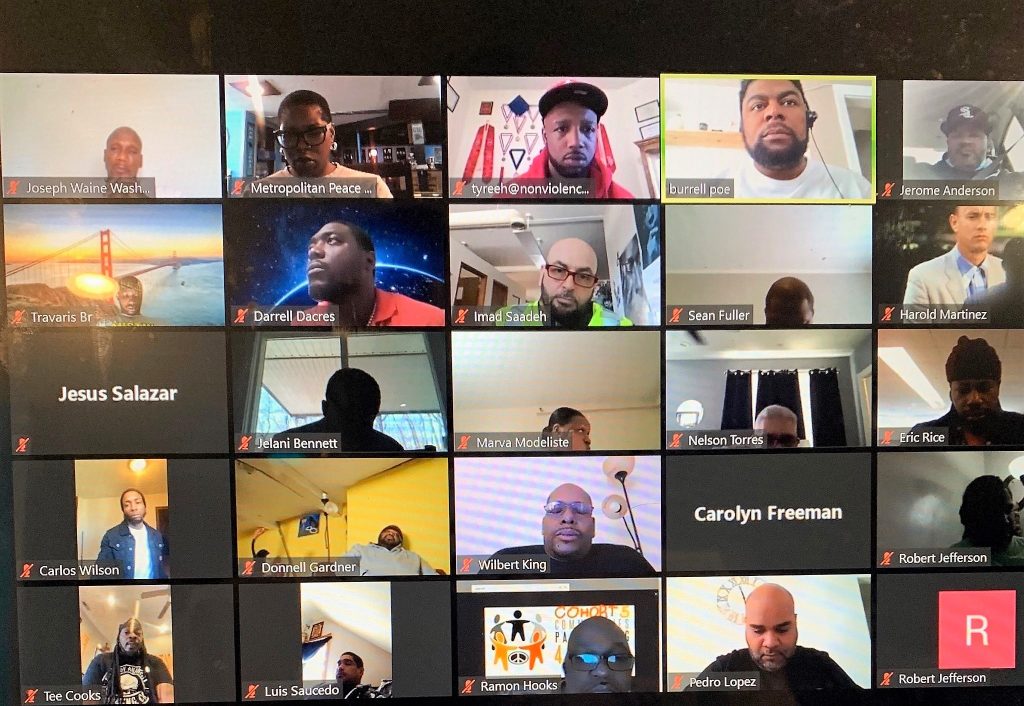Metropolitan Peace Academy: Street Outreach Training During COVID-19
For Nelson Torres, Cierra McGee, and other members of ALSO’s street outreach team, reducing violence in Chicago’s Humboldt Park community continues during COVID-19. This spring, Torres and McGee and about 30 other outreach workers in Chicago are learning about their field through Zoom classes with the Metropolitan Peace Academy, a training ground committed to professionalizing the roles associated with the street outreach community. Since the Peace Academy started in 2018, nine ALSO outreach staff members have graduated from the program. In addition to training street outreach staff, the Peace Academy holds separate training sessions for caseworkers of community-based organizations that do street outreach work.
The Peace Academy is building a citywide network of outreach workers. Topics typically include structural violence, restorative justice, and, now, COVID-19, and are often facilitated by experts in the field. Torres and McGee are in the first Peace Academy cohort that is taking classes online – and the first that has had to adapt to doing their jobs during COVID-19.
Outreach During COVID-19
“We’ve adjusted the training to speak to the significance of the COVID outbreak and how it affects outreach work,” says Vanessa DeReef, training manager of the Academy. “Every lesson is either directly related to COVID or has been adjusted to reflect what’s going on now.” One training session, DeReef says, featured Chicago physician Dr. Kenneth Naze, who spoke directly with the group about safety measures, marginalized communities, and how a public health model applies to the outbreak. The program has also revisited self-care issues.
One training focused on high risk red flag relationships, which focus on the intersection of community violence and domestic violence. The training was developed by ALSO and facilitated by Tara Campbell, Safe Streets Resilience Program Manager for ALSO, and Tony Raggs, Safe Streets Outreach Program Manager.
The red flags relationship training is a regular part of the Academy’s curriculum. At this time, focusing on the impact of domestic violence in the training also aligns with conversations about COVID-19; many news reports have detailed the increase in domestic violence incidents during COVID-19, when many vulnerable people are sheltering at home. In March, for example, the city of Chicago reported an increase in the number of domestic violence calls to hotlines in the city and the greater Chicago area.
Learning Online
DeReef says that the Peace Academy is designed to be taught in person but has transitioned to online learning during the COVID-19 crisis. “We are still able to establish a sense of community even if we can’t be in the same room,” she says. Participants have a chance to check in about their work, share their accomplishments, and support each other. In some cases, they get together in smaller virtual breakout rooms to explore a topic. “Doing this,” DeReef says, “keeps that ‘getting to know you’ community feel that we want to create.”
Nelson Torres says both styles of learning – online and in-person have worked for him at the Academy. “Online learning,” he says, “has been exciting for me. I just set up the laptop and I’m ready to go.”
“People have been very focused on learning online, and it’s working,” Torres adds. “Whether it’s in-person or online, one way the training helps is because we have a chance to learn from other agencies in different parts of the city – what they go through and how they work with participants. I’ve learned from everybody in the program.”
“It’s kind of like a community,” adds McGee. “We share what we’re doing in the field, and applying what we learn to our work. It’s also been helpful to learn about how people are being affected by COVID.”
Before COVID-19, the 18-week program was held in four-hour sessions, twice a week. Now, participants engage in four two-hour sessions a week. The goal is to complete the program by mid-June.
The Peace Academy is a project of Communities Partnering 4 Peace (CP4P), which features ALSO and other leading outreach organizations who have combined their expertise to jointly impact Chicago communities most impacted by gun violence.
RECAP:
The Metropolitan Peace Academy, a training ground for the street outreach community in Chicago, continues to offer trainings during COVID-19.
“We’ve adjusted the training to speak to the significance of the COVID outbreak and how it affects outreach work,” says Vanessa DeReef, training manager of the Academy. “Every lesson is either directly related to COVID or has been adjusted to reflect what’s going on now.”
The Peace Academy is designed to be taught in person but has transitioned to online learning during the COVID-19 crisis. Participants have a chance to check in about their work, share their accomplishments, and support each other.
The Peace Academy is a project of Communities Partnering 4 Peace (CP4P), which features ALSO and other leading outreach organizations who have combined their expertise to jointly impact nine Chicago communities most impacted by gun violence.
ALSO is an organization committed to end violence in homes and communities nationwide. Your contribution will help us live out our mission to develop, promote and implement model programs in order to build a movement for peace and safety in the coming year.
With your support, we will:
- Continue providing jobs for in-risk youth through our 10-10-10 job training program.
- Provide bystander intervention training for youth and community members, giving people the skills to know how to increase safety in high risk situations.
- Explore and reveal the relationship between intimate partner and community violence to create programming that will reduce both.



